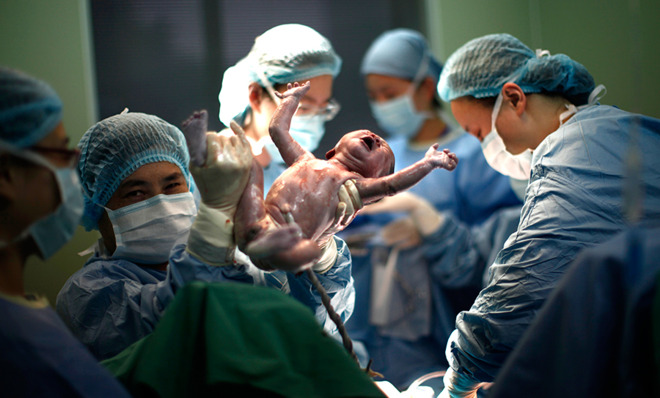These two studies should be a wake-up call to natural-childbirth extremists
You can't lay America's infant mortality rate at the feet of doctors


A free daily email with the biggest news stories of the day – and the best features from TheWeek.com
You are now subscribed
Your newsletter sign-up was successful
There is a lot of guilt surrounding childbirth these days.
Many women, including actress Kate Winslet, are ashamed about having a C-section. Women who have opted for pain medication have reported feeling guilty about it. Medicalized births can even be a source of PTSD.
At the center of this guilt is a belief that doctors and hospitals can't be trusted. By doing what medical experts recommend, many think, a woman has somehow failed herself and her child. Indeed, alternative-birth advocates have long cited the high rate of infant mortality and C-sections as reasons to steer clear of a typical, medicated hospital birth at all cost. But as two new papers show, that just doesn't align with the data.
The Week
Escape your echo chamber. Get the facts behind the news, plus analysis from multiple perspectives.

Sign up for The Week's Free Newsletters
From our morning news briefing to a weekly Good News Newsletter, get the best of The Week delivered directly to your inbox.
From our morning news briefing to a weekly Good News Newsletter, get the best of The Week delivered directly to your inbox.
First off, the infant mortality rate in the U.S. isn't nearly as high as we think. The Centers for Disease Control and Prevention ranks us at an embarrassing 56th in the world, with 6.1 deaths per 1,000 births. According to a draft paper from health economists at the University of Chicago, USC, and MIT, comparing the U.S.'s rate with that of Finland and Austria, this isn't entirely true.
What's hiking up the U.S. rate is the fact that we define extremely preterm births as live births, while other countries consider them miscarriages or stillbirths. So if a baby is born before 23 weeks and doesn't make it — which is highly likely — his or her death will be included in our national infant-mortality rate. This difference accounts for 40 percent of the U.S.'s infant-mortality rate compared with that of countries like Austria and Finland, which has the lowest rate in the world.
Even more interesting is the fact that neonatal deaths are actually less frequent in the U.S. than they are in Austria and Finland, once the researchers accounted for the babies who die months after they leave the hospital and go home. So for a good many children who don't make it to their first birthdays, doctors and hospitals aren't the problem; what happens after the babies leave is.
It should come as no surprise that the babies who are more likely to die at home are those born into poor families. In fact, there is no difference in infant mortality between wealthy women in the U.S. and those in Finland or Austria. There is, however, a big difference between wealthy states like California and poor ones like Mississippi.
A free daily email with the biggest news stories of the day – and the best features from TheWeek.com
The other new paper that guilty mothers should pay attention to is in the Journal of the American Medical Association. It shows that there is actually no connection between C-section rates and increased maternal or neonatal complications or morbidity.
This isn't to say that we shouldn't be working to reduce the unnecessarily high C-section rate in our country, something doctors agree should be changed but warn us can't happen overnight. But we need to put to rest the idea that if a woman does get a C-section, the chances of something going wrong are higher.
One way women can relieve themselves of the guilt surrounding childbirth is by trusting experts. That's not to say that women shouldn't educate themselves or feel empowered in the delivery room, just that it is OK to let go and rely on to the experience and instincts of our doctors. As these studies suggest, we are in pretty good hands.
Elissa Strauss writes about the intersection of gender and culture for TheWeek.com. She also writes regularly for Elle.com and the Jewish Daily Forward, where she is a weekly columnist.
-
 How to Get to Heaven from Belfast: a ‘highly entertaining ride’
How to Get to Heaven from Belfast: a ‘highly entertaining ride’The Week Recommends Mystery-comedy from the creator of Derry Girls should be ‘your new binge-watch’
-
 The 8 best TV shows of the 1960s
The 8 best TV shows of the 1960sThe standout shows of this decade take viewers from outer space to the Wild West
-
 Microdramas are booming
Microdramas are boomingUnder the radar Scroll to watch a whole movie
